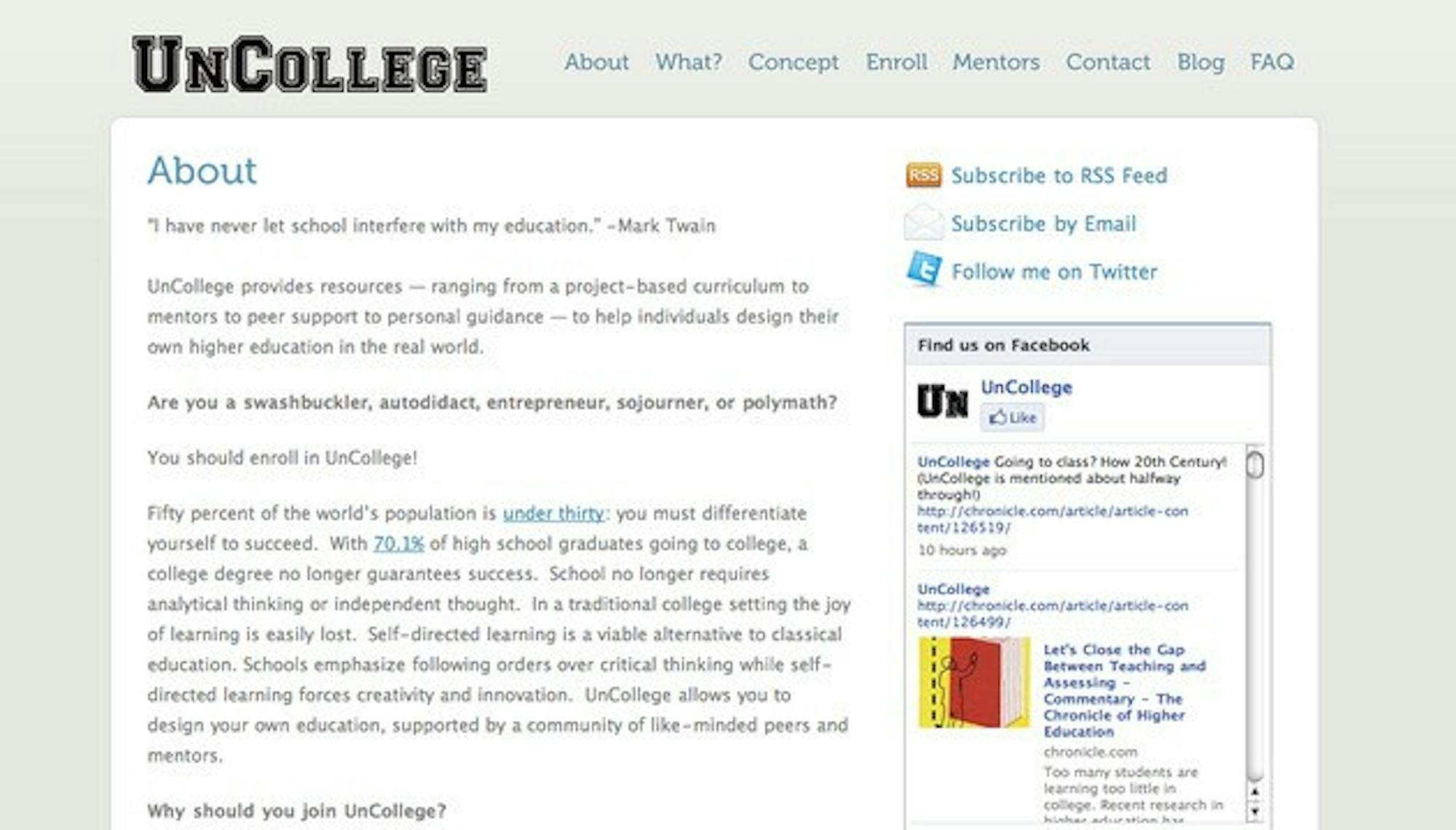UnCollege students must fulfill several requirements, such as writing a "This I Believe" essay, living abroad for three months and volunteering for at least 200 hours before graduating from the non-accredited program, Stephens said.
UnCollege which first gained national attention when The Chronicle of Higher Education reported on its inception in early February will likely encourage students to pursue certain projects, such as founding a business and learning a language, according to Stephens. Students must also take courses at traditional academic institutions and design their own individualized courses, Stephens said.
Stephens, who was home-schooled until college, said he believes traditional educational environments often neglect these "soft" skills, like effective communication. Rather than foster innovative thinking, the typical classroom experience simply teaches students to accurately follow directions, he said.
"I think its unfortunate that the classical education model was designed during the Industrial Revolution, basically to train individuals to be factory workers," Stephens said. "There was not an emphasis on creativity, independent thought or analytical thinking or any of those skills that today are required for success in a globalized environment."
Fifteen students are currently enrolled in UnCollege, which began approximately a month ago. Stephens said he expects a class of 30 to enroll in the program's first year.
UnCollege will not feature traditional grades or evaluations, Stephens said. Students will instead work with a network of mentors, who provide feedback and assistance with project ideas. Peer "accountability buddies" will also ensure that students fulfill their commitments, Stephens said.
UnCollege's lack of accreditation may discourage interested students in certain fields such as medicine from pursuing its curriculum independently from an actual college degree, Goldman said in an e-mail to The Dartmouth. Its emphasis on independent skills, however, may benefit students interested in entrepreneurship, business and the arts, according to Goldman.
"A recruit who got into, and out of, a good institution can be assumed to have certain skills," Goldman said in her e-mail. "An UnCollege student will have other evidence for accomplishment, and much of it might be more relevant or real-world than a theory class or essay from college."
The practical elements of the program will help UnCollege graduates secure employment, Stephens said.
"I think that ultimately, competency trumps certification," he said. "If you can prove you've been successful in the real world, that means more than the homework assignments that you've turned in."
Students can gain organization, creativity and leadership skills through participation in the program, Stephens said.
"The greatest learning outcome of self-directed learning is not academically what you learn, but rather the leadership experience you gain in designing your own education," he said. "Instead of following directions from a teacher, you are serving as both professor and a student."
Goldman and Stephens hope that UnCollege may eventually act as both a supplement and replacement for a traditional college experience, Stephens said.
"I don't think I am going to completely replace the collegiate system," he said. "I would like to change the notion that a degree is a requisite for success I believe there are other ways to gain the knowledge required to succeed."
A tuition charge of $100 per student currently finances website hosting and curriculum development, according to UnCollege's site. Stephens said he plans to seek non-profit status for the program.
Goldman has completed the majority of the projects currently included in the UnCollege curriculum, she said in an e-mail to The Dartmouth. At the age of 17, she attended the International Whaling Commission in Chile as a nongovernmental organization representative to lobby commissioners from multiple nations completing one mandatory stipulation of UnCollege in which participants must attend a conference.
Goldman also lived abroad in Kenya for six months in which she developed marketing strategies for several organizations and conducted scientific research on baboon ecology and human-wildlife conflict, she said in her e-mail.
Her experiences have enabled her to "design and execute scientific research," collaborate with a diverse team of individuals to address worldwide issues and present new ideas to an audience ranging from scientists and high-level government officials to Kenyan farmers, Goldman said in her e-mail.
Stephens and Goldman will sit on UnCollege's board of directors with Alice Floros, a sophomore at the University of Missouri, St. Louis. They may hire additional staff in the future to assist with UnCollege operations, Stephens said.




